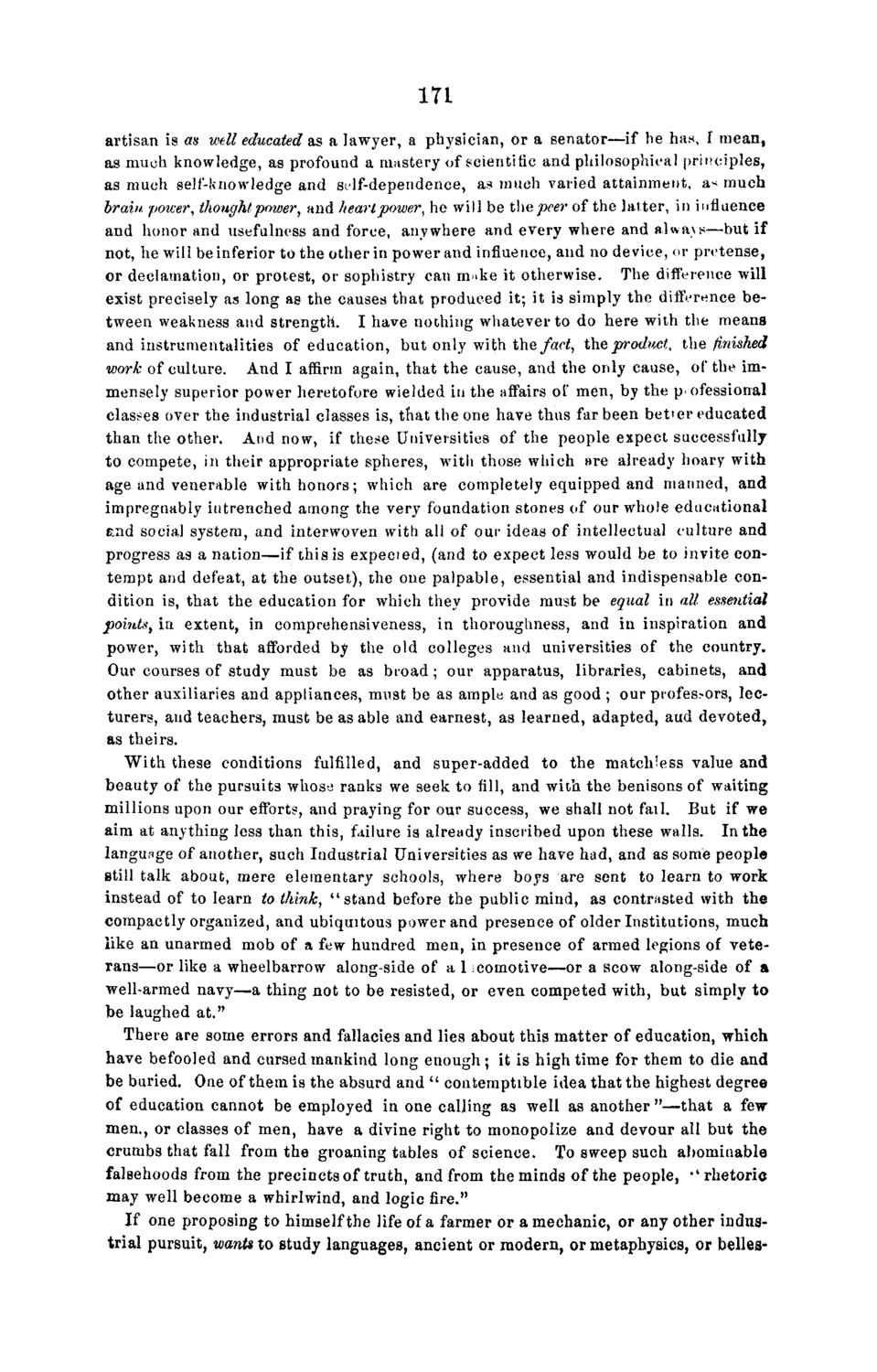| |
| |
Caption: Board of Trustees Minutes - 1868
This is a reduced-resolution page image for fast online browsing.

EXTRACTED TEXT FROM PAGE:
171 artisan is as well educated as a lawyer, a physician, or a senator—if he han, f mean, as much knowledge, as profound a mastery of scientific and philosophical principles, as much self-knowledge and self-dependence, as much varied attainment, as much brain power, thought power, and heart power, he will be the peer of the latter, in influence and honor and usefulness and force, anywhere and every where and always—but if not, he will be inferior to the other in power and influence, and no device, or pretense, or declamation, or protest, or sophistry can m«ke it otherwise. The difference will exist precisely as long as the causes that produced it; it is simply the difference between weakness and strength. I have nothing whatever to do here with the means and instrumentalities of education, but only with the fact, the product, the finished work of culture. And I affirm again, that the cause, and the only cause, of the immensely superior power heretofore wielded in the affairs of men, by the professional clashes over the industrial classes is, that the one have thus far been better educated than the other. And now, if these Universities of the people expect successfully to compete, in their appropriate spheres, with those which are already hoary with age and venerable with honors; which are completely equipped and manned, and impregnably intrenched among the very foundation stones of our whole educational and social system, and interwoven with all of our ideas of intellectual culture and progress as a nation—if this is expecied, (and to expect less would be to invite contempt and defeat, at the outset), the one palpable, essential and indispensable condition is, that the education for which they provide must be equal in all esse?Uial points, in extent, in comprehensiveness, in thoroughness, and in inspiration and power, with that afforded by the old colleges and universities of the country. Our courses of study must be as broad; our apparatus, libraries, cabinets, and other auxiliaries and appliances, must be as ample and as good ; our professors, lecturers, and teachers, must be as able and earnest, as learned, adapted, aud devoted, as theirs. With these conditions fulfilled, and super-added to the matchless value and beauty of the pursuits whose ranks we seek to fill, and with the benisons of waiting millions upon our efforts, and praying for our success, we shall not fail. But if we aim at anything less than this, failure is already inscribed upon these walls. In the language of another, such Industrial Universities as we have had, and as some people still talk about, mere elementary schools, where boys are sent to learn to work instead of to learn to think, "stand before the public mind, as contrasted with the compactly organized, and ubiquitous power and presence of older Institutions, much like an unarmed mob of a few hundred men, in presence of armed legions of veterans—or like a wheelbarrow along-side of a 1 ;comotive—or a scow along-side of a well-armed navy—a thing not to be resisted, or even competed with, but simply to be laughed at." There are some errors and fallacies and lies about this matter of education, which have befooled and cursed mankind long enough; it is high time for them to die and be buried. One of them is the absurd and " contemptible idea that the highest degree of education cannot be employed in one calling as well as another "—that a fewmen., or classes of men, have a divine right to monopolize and devour all but the crumbs that fall from the groaning tables of science. To sweep such abominable falsehoods from the precincts of truth, and from the minds of the people, ,4 rhetoric may well become a whirlwind, and logic fire." If one proposing to himself the life of a farmer or a mechanic, or any other industrial pursuit, wants to study languages, ancient or modern, or metaphysics, or belles-
| |